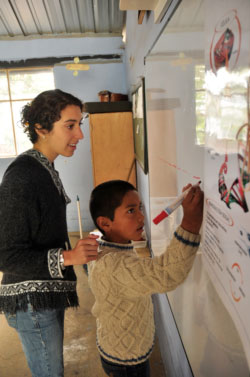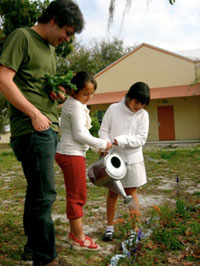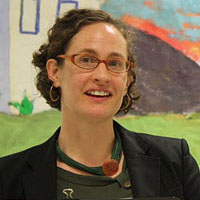Tell us about some of your experiences with community service in Latin America.
My sophomore year I led a spring break service trip to Ecuador where I helped build a playground at a school with an indigenous community in an rural region of the country. I never expected that I would return to Ecuador about a year later! During my junior year I began taking Education courses in combination with courses for my Spanish major and I discovered my passion for teaching….To combine my love for Spanish, working with kids, serving in an international setting, and my new-found love for teaching, I opted to gain fluency in Spanish during a summer volunteer experience at La Fundación Campamento Cristiano Esperanza (Camp Hope) in Ecuador. A Preston Public Interest Career Fund Summer Fellowship and the Global Citizen's Grant funded my 11-week internship during the summer of 2010.
Tell us more about Camp Hope.
Camp Hope is an educational non-profit and orphanage for children with disabilities in Quito, Ecuador. Located in an underprivileged, industrial area of the city, Camp Hope provides attention, recreation, rehabilitation, education, spiritual support, and vocational resources to economically, physically, and mentally challenged children to enable them to attain their goals of independence and integration into society. I taught lessons to K-7 students in English, Photography, and Bodily Systems, translated for visiting medical professionals, developed an English curriculum for future volunteers, co-taught CPR and First Aid, and assisted with daily routines and therapy for children with severe autism, cerebral palsy, and other disabilities.
Do you have a particular experience that you would like to share about Bowdoin or LAS?
I am so thankful for the opportunities Bowdoin has provided me with over these past four years to really be engaged in the community in profound ways and to build lasting connections…The internship at Camp Hope was one of the most incredible experiences I have had the privilege to enjoy. It has profoundly impacted my future goals and career plans - affirming my desire to be a teacher and serve in underprivileged communities. I learned how to better teach students with special needs and accommodate students at different levels in the classroom, and I gained a deeper understanding of the unique strengths and faults of non-profit organizations.
One of the most memorable aspects of my internship at Camp Hope is the quality of the relationships that I built with the children and staff at the foundation. Having a great relationship with the kids, earning their respect and love, and setting a good example is so important in one’s ability to teach. I believe the positive relationships I shared with the students contributed to their desire to learn. Also, through strong ties made with the teachers and staff, we mutually dismantled cultural stereotypes and stigmas...Working with children who could not hear, speak, or feed themselves, let alone smile or hug me, made me confront the deeper issues surrounding my personal motivation to serve.


